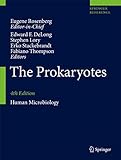The Prokaryotes : Human Microbiology / edited by Eugene Rosenberg, Edward F. DeLong, Stephen Lory, Erko Stackebrandt, Fabiano Thompson.
Tipo de material: TextoEditor: Berlin, Heidelberg : Springer Berlin Heidelberg : Imprint: Springer, 2013Edición: 4Descripción: xx, 556 páginas 178 ilustraciones, 146 ilustraciones en color. eReference. recurso en líneaTipo de contenido:
TextoEditor: Berlin, Heidelberg : Springer Berlin Heidelberg : Imprint: Springer, 2013Edición: 4Descripción: xx, 556 páginas 178 ilustraciones, 146 ilustraciones en color. eReference. recurso en líneaTipo de contenido: - texto
- computadora
- recurso en línea
- 9783642301445
- QR1-502
Springer eBooks
Preface -- Foreword -- About the Editors -- List of Contributors -- The gut microbiota -- Prebiotics -- Probiotics -- Identification of pathogens by classical clinical tests -- Identification of pathogens by nonculturing molecular techniques -- Bacterial Adhesion -- Cholera -- Tuberculosis -- Legionnaires' Disease -- Listeria -- Diphtheria -- Botulism and tetanus -- Whooping cough -- Dysentery -- Urinary tract infections -- Burn infections -- Typhoid -- Meningitis -- Rickettsiia diseases -- Syphilis -- Chlamydial diseases -- Bacterial Toxins.
The Prokaryotes is a comprehensive, multi-authored, peer reviewed reference work on Bacteria and Achaea. This fourth edition of The Prokaryotes is organized to cover all taxonomic diversity, using the family level to delineate chapters. Different from other resources, this new Springer product includes not only taxonomy, but also prokaryotic biology and technology of taxa in a broad context. Technological aspects highlight the usefulness of prokaryotes in processes and products, including biocontrol agents and as genetics tools. The content of the expanded fourth edition is divided into two parts: Part 1 contains review chapters dealing with the most important general concepts in molecular, applied and general prokaryote biology; Part 2 describes the known properties of specific taxonomic groups. Two completely new sections have been added to Part 1: bacterial communities and human bacteriology. The bacterial communities section reflects the growing realization that studies on pure cultures of bacteria have led to an incomplete picture of the microbial world for two fundamental reasons: the vast majority of bacteria in soil, water and associated with biological tissues are currently not culturable, and that an understanding of microbial ecology requires knowledge on how different bacterial species interact with each other in their natural environment. The new section on human microbiology deals with bacteria associated with healthy humans and bacterial pathogenesis. Each of the major human diseases caused by bacteria is reviewed, from identifying the pathogens by classical clinical and non-culturing techniques to the biochemical mechanisms of the disease process. The 4th edition of The Prokaryotes is the most complete resource on the biology of prokaryotes. The following volumes are published consecutively within the 4th Edition: Prokaryotic Biology and Symbiotic Associations Prokaryotic Communities and Ecophysiology Prokaryotic Physiology and Biochemistry Applied Bacteriology and Biotechnology Human Microbiology Actinobacteria Firmicutes Alphaproteobacteria and Betaproteobacteria Gammaproteobacteriav Deltaproteobacteria and Epsilonproteobacteria Other Major Lineages of Bacteria and the Archaea
Para consulta fuera de la UANL se requiere clave de acceso remoto.


